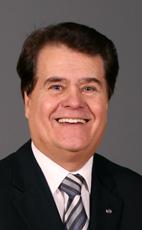Mr. Speaker, I am pleased to participate in today's debate on Bill C-53 creating the Department of Canadian Heritage.
First of all, I think it is essential for all members of this House to be aware that this bill is a technicality.
Since our government has been in office, the Department of Canadian Heritage has vigorously pursued its mandate and played a key role in Canadian society. Its activities reflect a wide range of responsibilities in areas of cultural development, arts, broadcasting, national parks, historic sites, amateur sport and multiculturalism.
The department also administers official languages, state ceremonial and Native programs, which are all fundamental elements of the Canadian identity. In a world where international barriers are disappearing, where technology is altering borders, Canadian identity lies at the heart of our country's growth.
It goes without saying that the federal government needs an instrument such as the Department of Canadian Heritage to carry on its work to develop Canadian culture and promote Canadian identity.
I cannot describe in detail all the responsibilities entrusted to the Department of Canadian Heritage, but I will outline some of its activities that are essential to our society's development.
National parks and historic sites are concrete symbols of this country's wealth and an important part of the duties performed by the Department of Canadian Heritage which are designed to promote Canadian identity. Our natural heritage, our vast terri-
tory, our history and our place in the world play a crucial role in promoting our identity and the values we cherish as Canadians.
Furthermore, the official languages policy introduced by the federal government in the 1970s reflects a generous and creative vision. The Department of Canadian Heritage was assigned the responsibility of ensuring that French-and English-speaking Canadians feel at home wherever they choose to reside.
The principle of respect for both official languages of Canada, combined with respect for the traditions and contributions of aboriginal peoples, respect for our cultural diversity as well as fundamental respect for human rights make Canada a land of open-mindedness and opportunity that millions of people dream of around the world.
New Canadians and their language skills constitute a valuable asset for the Canadian society. Just think of the key role they play in our cultural exchanges and trade transactions with foreign countries. The heart of Canada is beating to the rhythm of our many cultures, and the impact of these new human resources will help us progress.
In the international arena, nations strive to find the way to bind together, with a deep feeling of national identity, populations made up of various ethnic, cultural, linguistic and racial groups. Several countries are currently looking seriously into the purely Canadian model we have come up with. The multicultural dimension of Canada is a rich social reality in our country, a reality that we must preserve.
Giving each Canadian the place he or she deserves in our society and the opportunity to contribute fully to building a stronger country can only benefit us all. In the enactment establishing the Department of Canadian Heritage, I note that the government undertakes to achieve equality for all Canadians in matters relating to the social, economic and cultural life of their country.
The Department of Canadian Heritage recognizes the need to remove barriers which divide Canada and build ties based on trust and respect. Bear in mind that the purpose of multiculturalism is to ensure social unity and strengthen national identity. Greater participation by all Canadians in community life can only serve to increase awareness of our cultural and natural wealth.
As for the policies and programs of the Canadian heritage department, their purpose is to promote a greater understanding of our diversity. Let us not forget that, for many communities, the economic and tourist activity generated by departmental operations is often vital. These are broad responsibilities that the Department of Canadian Heritage is fully capable of carrying out.
In closing, I wish to emphasize the need for Bill C-53 to be passed, to recognize formally the jurisdiction of the Department of Canadian Heritage and to allow the department to continue pursuing the mission it has been pursuing for a year and a half.

